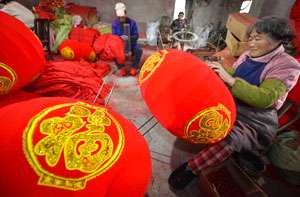
BEIJING - China will look to improve farmers' income growth and reduce obstacles in agricultural development next year, in a bid to boost vitality in rural areas, according to an annual conference.
At the Central Rural Work Conference that closed Saturday, Minister of Agriculture Han Changfu said while improving the country's basic rural system, China would focus on fostering new types of agricultural businesses.
This will require maintaining stable land contract relationships on the basis of household contract management while guiding the orderly transfer of farmers' land contract management rights, said Han.
It was agreed by delegates at the conference that farmers' rights will be fully protected, and land transfers should not be compulsory or restricted.
Participants at the meeting included scholars, experts and officials from the agricultural sector.
They agreed the government should work to create systems that are more organized when it comes to agricultural production and operation. The government should also increase support to new types of businesses like family farms and specialized cooperatives.
Delegates also agreed that while ensuring the nation's grain security and effective supply of major agricultural products, more work should be done on pricing and ensuring that farmers get a fair profit during times of rising production costs.
The growth of farmers' income should be maintained at the same pace, or even faster than that of urban residents, the meeting said.
The government will also further balance urban and rural development and make sure migrant workers from rural areas get equal treatment if they become urban residents, the meeting said.
According to the meeting, China will take ensuring another agricultural harvest as one of the tasks in the next year.
In 2012, China's grain output rose 3.2 percent year-on-year to hit 589.57 million tons, marking the ninth consecutive year of growth, according to data from the National Bureau of Statistics.
Despite the rising yield, the country still faces a tightening grain supply amid the increasing demand driven up by population growth. In response, China has increased its imports of farm produce to meet domestic needs.
To further ease the crunch, China will encourage more industrial and commercial enterprises to invest in agriculture, Han said.
Bi Meijia, the chief economic engineer with the Ministry of Agriculture, said more efforts are still needed to boost farmers' income, which have been dragged down by the rising production costs and increasing impact from the international markets.
He advised the government improve the agricultural protection system and expand the coverage of subsidies to benefit more farmers.
Minister of Finance Xie Xuren also pledged to intensify efforts to boost farmers' income by allocating targeted funds to stabilize grain prices and strengthening capital management for agricultural use at a national finance work meeting that closed Friday.
In 2013, the MOA will expand the pilot program of the registration of farmers' land contract management rights to more regions. The program is scheduled to be finished by 2017.
 Santa is coming and China takes more notice
Santa is coming and China takes more notice
 Doodle-design subway station for Chongqing passengers
Doodle-design subway station for Chongqing passengers
 Snow tourism flourishes in China's Snow Town
Snow tourism flourishes in China's Snow Town
 Green Christmas
Green Christmas
 Xi'an prepares for Beijing-Guangzhou high-speed rail
Xi'an prepares for Beijing-Guangzhou high-speed rail
 New suspension bridge over Yangtze in E China
New suspension bridge over Yangtze in E China
 All lit up
All lit up
 Domestic demand for Christmas products rise
Domestic demand for Christmas products rise